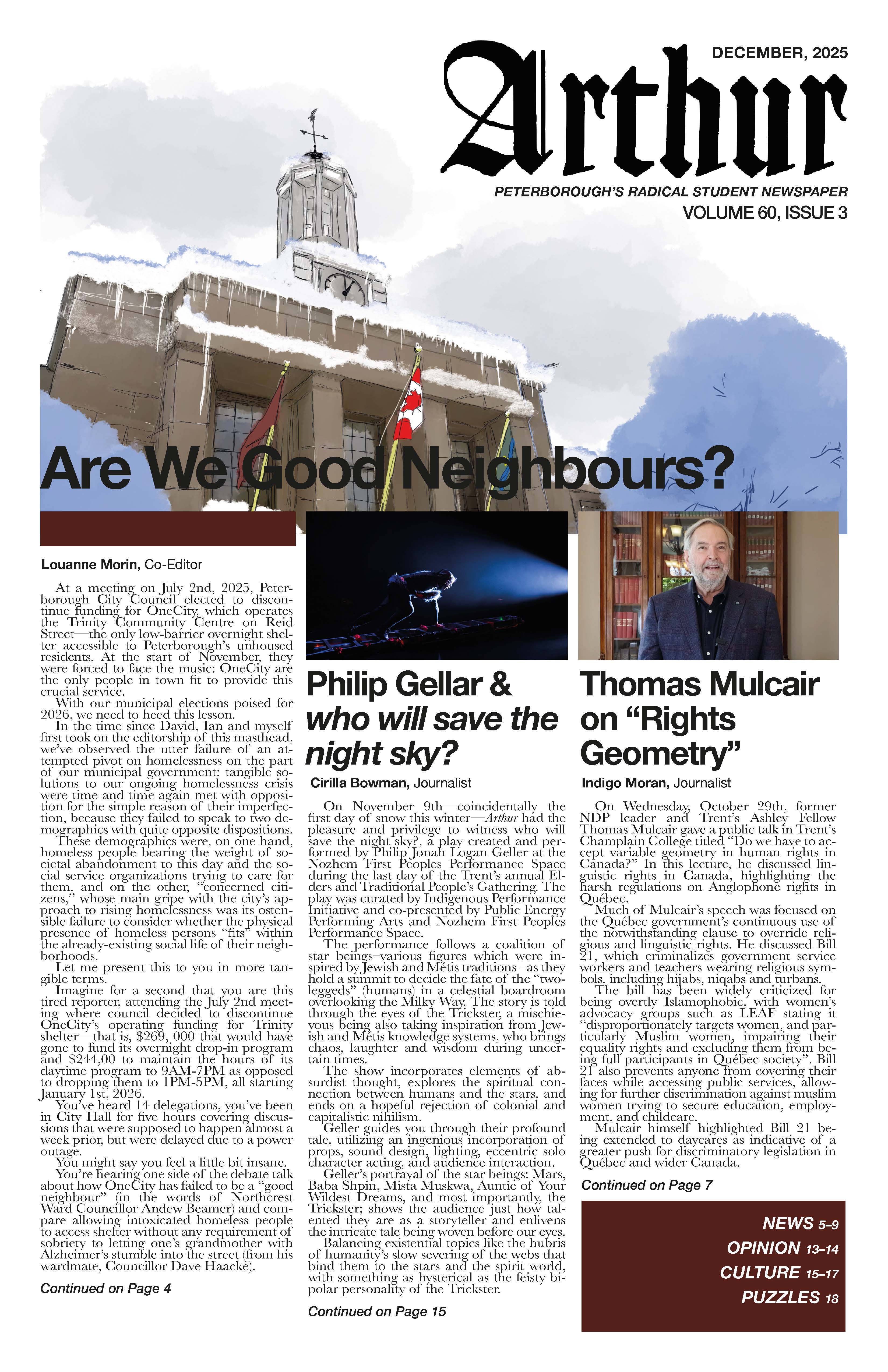Re: A Call for Love
With varying rates of success, Arthur has been publishing the occasional satire piece this semester. Ana Maria Zapata’s “A Call for Love” (Arthur Issue 19) is by far the most compelling. Satire is not merely humour for humour’s sake, but should contain a biting critique of a particular issue, person, etc. Zapata (a pseudonym perhaps?) has accomplished this and has spelled out “why we need feminism” more clearly than campaigns that give individuals the opportunity to answer that question for themselves.
Ana Maria shows us just how easy it is to be taken in by the lure of heteronormativity and anti-feminist thinking. (How could one be anti-feminist anyway? It would amount to denying the fight for equality amongst genders.)
Indeed, the lure of offspring, that historical placeholder of the female, is even more tempting. The author’s piece reels us in—really, she sharply writes—about how the joys of giving birth, parenting, raising a child into a person, struggling and sacrificing everything so your child can become greater than yourself, must be extremely rewarding.
But once we are captured by this position, if not the truth of parenting, Ana Maria throws the satire in our face. The joys of child-bearing and rearing are so evident, she continues, that all contemporary social, political and psychological problems seem to rest on the contemporary woman’s (N.B.: Ana Maria’s gender binary) refusal to bear and raise her own.
However, this was just a tangential remark. The major problem for Ana Maria in her satirical article is the recent self-love week at Trent. Self-love can appear as selfishness, Ana Maria argues through exaggeration. We see the appeal of such a viewpoint, then realize the rhetoric in her satirical voices. There is undoubtedly, she notes, few things better than giving yourself to another person and feeling, in return, a person giving their entire self to you (except perhaps bearing and raising offspring).
Yet, as Ana Maria strongly claims in her satirical mode, such an unyielding and uncompromising view of love, if uncritically absorbed by an individual, can quickly beget the subordination of women. History may repeat itself, Ana Maria tells us with her satire, even in the most seemingly natural, beautiful, and unproblematic way: heterosexual love.
Truly, if heterosexual love in the manner Ana Maria describes, as well as bearing and raising children, are the societal and cultural norms, it intensifies our valuing of self-love week, especially for and from individuals who struggle to legitimize their identities, potentials and happiness with and against norms of heterosexuality, monogamy, and child-bearing (among many other heteronormative positions Ana Maria would surely argue).
I appreciate, then, Ana Maria’s efforts in validating Trent students’ efforts in self-love week and for reinforcing our views as to why, even in 2014 when some believe gender equality has been achieved, feminism is a political and pragmatic position that must maintain its fortitude, guts, grit and backbone.
- Troy Bordun
Re: A Call for Love
I was shocked to open up Issue 19 of Arthur a few days ago to see that the article “A Call for Love” article was actually very anti-love.
I believe in the representation of all sides of an argument, but there are some things I feel that need to be addressed in regards to some of the opinions posed.
It astonishes me how the author used something as harmless as the act of loving yourself to attack other things they apparently find problematic about women. Don’t use self-love as a platform to boast your opinion on how feminists are too indulgent and abortions are terrible. Neither of those things are relevant.
Self-love is something we should all practice. If we don’t love ourselves, how are we supposed to love other people? If we don’t make ourselves happy, how are we supposed to care about the happiness of others?
If I wake up on the wrong side of the bed and I have a bad day, I’m not going to want to fucking smile at every person I see or give someone an “appreciation chocolate”; I’m going to eat that chocolate, I’m going to put on a great outfit or I’m going to stream my favourite TV show on Netflix.
Self-love is important. It’s fantastic that you care about the happiness of others, but you don’t showcase it very well by putting down those who practice self-love. It’s kind of hypocritical, don’t you think?
I also have a problem with the author’s view on feminism and have a hard time believing it has anything to do with the issue of self-love that she initially posed.
Feminism is about equality between the genders. It is extremely problematic that, in the article, you painted a picture that women only live to give guys a chance to be “gentlemen.”
The author lost me when they stated that self-love is “indulgent,” independence is terrible and, somehow, that wanting to appreciate yourself results in a sad, lonely future. I am very glad they are in a happy relationship with a caring boyfriend, but it is not relevant here as that is not the norm for everyone. That is not how all people express love. The author was wrong to bring gender politics into it.
If I’m kept in my sad, lonely “bubble” by feminism, it’s only because opinions like yours force it to become an ugly word.
Happiness comes in different forms. People practice self-love differently. If I experience happiness by doing something for others, that’s great. If I experience happiness by taking a bath and drinking a glass of wine, that’s great, too. The author’s opinions on feminism, birth-control, chivalry and other irrelevant topics created the opposite of a loving atmosphere. Instead of spreading love, they spread irrational and misinformed hate.
It wasn’t “A Call for Love.” It was “A Call to Hate Things I Hate, Too.”
- Anonymous
Re: Newfangled
There has been recent discussion and conflict at Trent due to the independently published Newfangled January issue. The issue entailed a reassessment of Nietzschean philosophy and its application to modern life as it is today, demanding a discussion and review of readers’ morals when it comes to spirituality - more specifically, the existence (or should I say, the death) of God.
This sparked an apparent theist-driven backlash at Trent, with an over-the-top article in Arthur and posters around the Symons campus, suggesting and networking for get-togethers to burn Newfangled.
My take on Newfangled’s January “God Is Dead” issue entails a couple of criticisms. First of all, Newfangled, it seems that you want to start this conflict for fun. I want to say that there is nothing at all radical about being an asshole. The thesis of the January issue seems to really be, “Look at how clever we are,” and not “Nietzsche is still relevant in modern society,” which he is, so it’s quite a shame that the point is being lost in self-congratulation and shit-disturbing.
If the issue was supposed to enlighten thought, then it was done wrong. If it was supposed to be satire, given the reply in Arthur’s last issue from the Christian apologizing (“Re: Newfangled Nonsense”), Christianity is obviously not the right target for satire.
In fact, I think many have grown weary of using religion as a punchline or as a target for satire. It’s not very funny or intellectual anymore. There are bigger societal problems in this community to shed light on anyway.
Newfangled, it seems, is pushing to divide and entrench people more than to foster open philosophical discussion. The issue reads as an obvious plant and moreover reads like publicity drumming and NOT satire.
The first response to Newfangled, written in Arthur, entitled “Newfangled Is No Good,” set itself up for attack in a way that no reasonable person would do and is, in fact, portraying Christians as being just that - unreasonable. This is, in effect, a strawman argument. To elaborate, a strawman argument is when you set up the opposing viewpoint to your own as being less sound and more vulnerable than it actually is as a way of strengthening your argument in comparison, as well as setting yourself up for an easier offensive.
Another separate comment I’d like to make is about the zine itself. The issue is published using regular paper and wastes a lot of space, which is divergent from radical zine form. This shows a real lack of understanding of zine culture itself. Their publication’s physical format is also quite wasteful with physical materials and spatial economy. To me, this means that Newfangled is neither radical in its form nor its content.
I want you to sincerely think about the criticisms I just gave about Newfangled and about whether or not the backlash was a plant generated by Newfangled themselves. What do you think now? Is this really radical? I dare readers to be critical of this and to think even more openly and assess what Newfangled’s real goals are.
Love, Janie Jones
P.S. I am obviously aware that I am “feeding the troll” right now. I acknowledge the fact that Newfangled feeds off of any kind of notoriety. Perhaps there is nothing more to Newfangled than generating backlash like this, but hopefully this article can work as a sacrificial example shedding light on the zine’s hollow intellectualism.
LGBTQ Discrimination in Catholic Schools
Dear editors,
My 10-year-old niece, Lily, is a pupil at a Catholic school here in Peterborough. She was asked to write a speech as a homework assignment along with the rest of the class. Each child was told that they could write about anything that they wanted and they would be given the opportunity to present their speeches to the school community.
Lily wrote a beautiful speech about the LGBTQ community and anti-discrimination. After handing in the speech, she was told by the principal that she could not read her speech because of the subject matter.
The situation has raised some concerns: Firstly, the Catholic School Board refuses to educate its pupils about anti-discrimination/LGBTQ rights and issues, and therefore perpetuates such discrimination and homophobia. Secondly, Lily’s educational right to equality of opportunity is being denied, as is her right to freedom of expression. She is being excluded from a class activity because of the oppressive and discriminatory ideology of the Catholic Church/School.
I want to make it clear, however, that this is not the fault of the classroom teacher, who Lily is very fond of, but is more of a systemic problem. The teacher has offered my niece alternative options as a way to accommodate for the school/school board’s failure.
Lily worked incredibly hard on her speech, was so excited to present it, and came home upset and disappointed. I was hoping you could help make this public, and give back to Lily the voice that she has been denied. The school/church should not ‘win,’ and Lily should not be punished for the subject matter of her speech, but should be praised because of it. I have included a short excerpt from Lily’s speech:
“Love does not have a face or a gender…No one can tell you who to love even if it’s a man or a woman. You can’t change who you love. You can’t change your heart. Canada accepts people that are different orientations … It doesn’t matter if you are gay or lesbian. Even if people make fun of you, ignore them be yourself be who you are. Thank you for letting me be here today to tell you my speech”.
Kate Gentle


.png)


.jpg)


.jpeg)



.jpg)

.jpg)



.jpg)



.jpg)


.png)